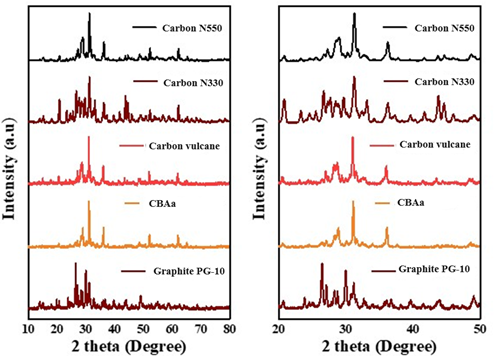
Effect of carbon black from Ageratina adenophora and various other carbon anode plate additives on the performance of lead acid batteries
Abstract
Keywords
Full Text:
PDFReferences
Yanamandra K, Pinisetty D, Daoud A, Gupta N. Recycling of li-ion and lead acid batteries: a review. J Indian Inst Sci. 2022;102:281–295. doi:10.1007/s41745-021-00269-7
Yanamandra K, Pinisetty D, Gupta N. Impact of carbon additives on lead-acid battery electrodes: A review. Renewable Sustain Energy Rev. 2023;173:113078. doi:10.1016/j.rser.2022.113078
Kwiecien M, Schröer P, Kuipers M, Sauer DU. 4-current research topics for lead–acid batteries. Lead-Acid Batteries Future Automob. 2017;133–146. doi:10.1016/B978-0-444-63700-0.00004-0
Shi J, Lin N, Wang Y, Liu D, Lin H. The application of rice husk-based porous carbon in positive electrodes of lead acid batteries. J Energy Storage. 2020;30:101392. doi:10.1016/j.est.2020.101392
Wang J, Dong L, Liu M, Wang J, Shao Q, Li A. Significantly improved high-rate partial-state-of-charge performance of lead-acid batteries induced by trace amount of graphene oxide nanosheets. J Energy Storage. 2020;29:101325. doi:10.1016/j.est.2020.101325
Moseley PT, R and DAJ, Peters K. Enhancing the performance of lead-acid batteries with carbon—in pursuit of an understanding. J Power Sources. 2015;295:268–274. doi:10.1016/j.jpowsour.2015.07.009
Shiomi M, Funato T, Nakamura K, Takahashi K, Tsubota M. Effects of carbon in negative plates on cycle-life performance of valve-regulated lead acid batteries. J Power Sources. 1997;64:147–152. doi:10.1016/S0378-7753(96)02515-3
Moseley PT, Nelson RF, Hollenkamp AF. The role of carbon in valve-regulated lead-acid battery technology. J Power Sources. 2006;157:3–10. doi:10.1016/j.jpowsour.2006.02.031
Pavlov D, Rogachev T, Nikolov P, Petkova G. Mechanism of action of electrochemically active carbons on the processes that take place at the negative plates of lead-acid batteries. J Power Sources. 2009;191:58–75. doi:10.1016/j.jpowsour.2008.11.056
Calábek M, Micka K, Krivák P, Baca P. Significance of carbon additive in negative lead-acid battery electrodes. J Power Sources. 2006;158:864–867. doi:10.1016/j.jpowsour.2005.11.022
Krivik P, Micka K, Baca P, Tonar K, Toser P. Effect of additives on the performance of negative lead-acid battery electrodes during formation and partial state of charge operation. J Power Sources. 2012;209:15–19. doi:10.1016/j.jpowsour.2011.11.058
Fernández M, Valenciano J, Trinidad F, Munoz N. The use of activated carbon and graphite for the development of lead-acid batteries for hybrid vehicle applications. J Power Sources. 2010;195: 4458–4469. doi:10.1016/j.jpowsour.2009.12.131
Moseley PT, Rand DAJ, Peters K. Enhancing the performance of lead–acid batteries with carbon – in pursuit of an understanding. J Power Sources. 2015;295:268–274. doi:10.1016/j.jpowsour.2015.07.009
Enos DG, Ferreira SR, Barkholtz HM, Baca W, Fenstermacher S. Understanding function and performance of carbon additives in lead-acid batteries. J Electrochem Soc. 2017;164:A3276–A3284. doi:10.1149/2.1031713jes
Bullock KR. Carbon reactions and effects on valve-regulated lead-acid (VRLA) battery cycle life in high-rate, partial state of charge cycling. J Power Sources. 2010;195:4513–4519. doi:10.1016/j.jpowsour.2009.10.027
Pavlov D, Nikolov P, Rogachev T. Influence of carbons on the structure of the negative active material of lead-acid batteries and on battery performance. J Power Sources. 2011;196:5155–5167. doi:10.1016/j.jpowsour.2011.02.014
Logeshkumar S, Manoharan R. Influence of some nanostructured materials additives on the performance of lead acid battery negative electrodes. Electrochim Acta. 2014;144:147–153. doi:10.1016/j.electacta.2014.08.080
Saravanan M, Sennu P, Ganesan M, Ambalavanan S. Multiwalled carbon nanotubes percolation network enhanced the performance of negative electrode for lead-acid battery. J Electrochem Soc. 2013;160:A70–A76. doi:10.1149/2.062301jes
Marom R, Ziv B, Banerjee A, Cahana B, Luski S, Aurbach D. Enhanced performance of starter lighting ignition type lead-acid batteries with carbon nanotubes as an additive to the active mass. J Power Sources. 2015;296(20):78–85. doi:10.1016/j.jpowsour.2015.07.007
Zhao R, Wang F, Li H, Shi G, Chen H, Xiong Z, Hu J, Wang H. Preparation of an activated carbon suitable for lead-acid battery based on abandoned plastic. In: 8th International Conference on Lead-Acid Batteries Proceedings, Albena, Bulgaria 2011:55–58.
Kunming University of Science and Technology, Preparation method of A. adenophora-base high-specific-area activated carbon CN104692380A, 2015.
Liu H, Zhao Q, Cheng Y. Composted invasive plant A. adenophora enhanced barley (Hordeum vulgare) growth and soil conditions. PLoS One; 2022;17(9):29. doi:10.1371/journal.pone.0275302
DOI: https://doi.org/10.15826/chimtech.2024.11.2.03
Copyright (c) 2024 Subban Ravi, Baskaran Vignesh, Nagarajan Meimoorthy, Bharathamani Dhanus Kumar, Lakshmanan Sathishkumar, Nagarajan Mohankumar, Nagarajan Kannapiran

This work is licensed under a Creative Commons Attribution 4.0 International License.
Chimica Techno Acta, 2014–2025
eISSN 2411-1414
Copyright Notice







